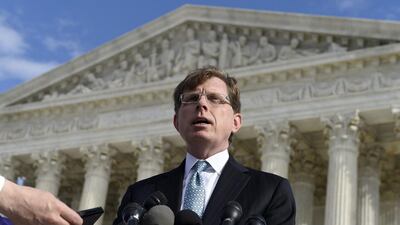If you were to enter a KFC, say, and shout “Free speech is under attack”, most of the diners would look up in concern – and not just because you had disturbed their quiet contemplation and mastication of one of the culinary delights for which we daily give thanks to the late Colonel Sanders.
Everyone is in favour of free speech, in theory at least. And so there is an almost knee jerk reaction when there are headlines, as there have been in the last few days, about US Supreme Court Justices weighing “limits of free speech over the internet”, or that the “Malaysian Premier says Sedition Act will stand”, or whether the “no platform” movement, which seeks to ban certain viewpoints from being expressed in public, is stifling discussion. Any restriction, goes the instinctive liberal response, is surely wrong.
Free speech advocates often appear to argue that there should be virtually no limits at all and they point to the situation in the US as the ideal. There the first amendment forbids Congress from making any law “abridging the freedom of speech, or of the press”. This sounds fine in principle. In practice, it means that hate speech is allowed. It means that ludicrous claims that Barack Obama falsified his birth certificate to show he was born in Hawaii, not in Kenya, have continued to circulate, even after he released a copy of his long-form birth certificate in 2011. Poll after poll shows that significant percentages of the American populace believe this nonsense, just as around one in five Americans think he is a Muslim. This is because when speech is that free, the truth struggles to emerge.
That liberty extends to publishing highly libellous statements. A few years ago, on the way to interview a leading liberal now in the US Senate, I leafed through his latest book. I was astonished to come across a passage in which he accused a well-known Republican of smearing an opposition candidate as a paedophile. There are few graver charges, and in Britain that person would have either sued and won – and the book would have been pulped – or had to accept that it was true, and his political career would have ended in disgrace.
The UK’s libel laws are often criticised for being restrictive. But they ensure any writer, publisher or broadcaster thinks twice about whether something is true or not before disseminating it, which one might judge of greater service to the public than the US free for all.
There are limits not just in Britain but almost everywhere, and it is entirely appropriate that those limits should reflect the cultures and traditions of the countries in question. A 2013 report by the Doha Centre for Media Freedom noted that “all of the GCC countries except Saudi Arabia guarantee freedom of expression in some way. However, they all contain a similar clause: ‘ ... within the limits of the law’. While at first glance this wording seems quite restrictive, the approach is no different than countries with established press freedoms. In all nations, laws and court rulings have created legitimate limits on the power of the press.” And I have no doubt that most GCC citizens, like most citizens of European countries, are quite happy with such a balance.
It is within that context that one should see the recent move to strengthen the Sedition Act in Malaysia, which has been a beacon of free speech within the region. By contrast, in Singapore, a gathering of five or more people can be designated an “unlawful assembly”. In Thailand, the venerable intellectual Sulak Sivaraksa has recently been sued under the country’s draconian lese-majeste law for questioning the veracity of a story about a duel between an elephant and a king who ruled four centuries ago. In Vietnam, dissident bloggers have been detained, jailed and beaten. In Malaysia, on the other hand, such critics thrive in the country’s online publications.
That is not going to change. The Sedition Act is going to be strengthened to protect Islam, other religions, the Malay people and the hereditary rulers from insult, and to guard against anyone proposing secession for East Malaysia. Government supporters would contend that the move is necessary to preserve harmony in a country in which the majority race, the Malays, still control only 24 per cent of the economy.
The debate will be over the implementation, just as it is in all the other countries that have laws about what can and cannot be said and printed. Returning to the headlines I referenced earlier, the case in America is over one Anthony Elonis, who was jailed for posting horrific, threatening comments on Facebook about killing his former wife, slitting the throat of an FBI agent and the possibility of going on a shooting spree at a kindergarten.
The US Supreme Court is now considering freeing him on the grounds that his constitutional right to freedom of expression may have been violated. That says it all. Unfettered free speech may be a dream for some, but in practice it is a nightmare – as the former Mrs Elonis knows only too well. If we accept that, then everything else is merely about striking the right balance – and that should be a subject for calm debate, not hysterical reactions and headlines.
Sholto Byrnes is a commentator and editor based in Doha and Kuala Lumpur


